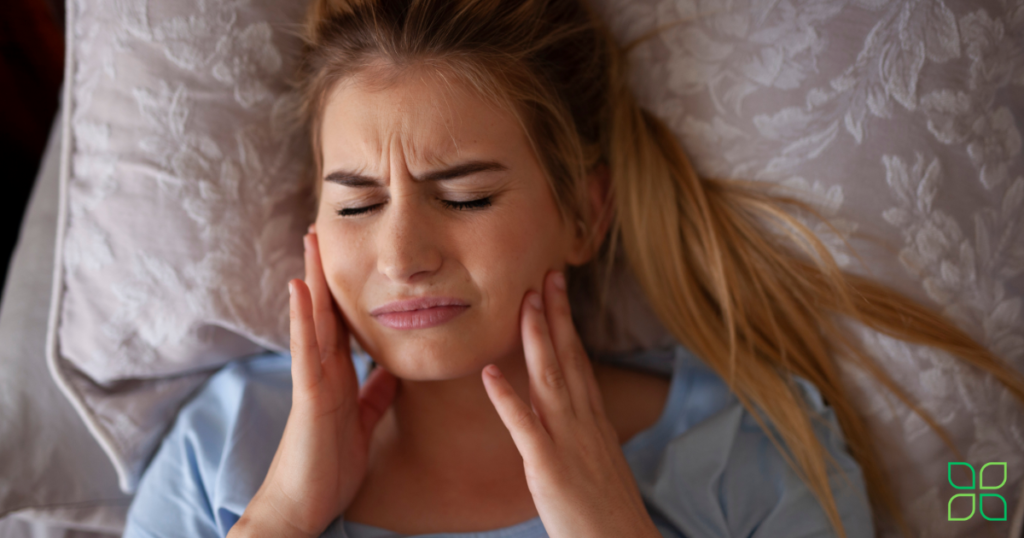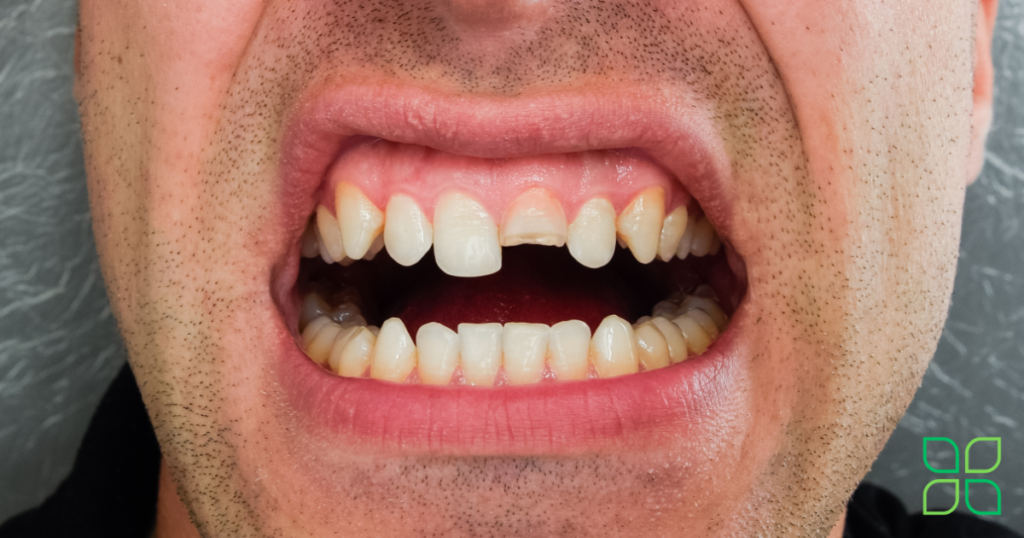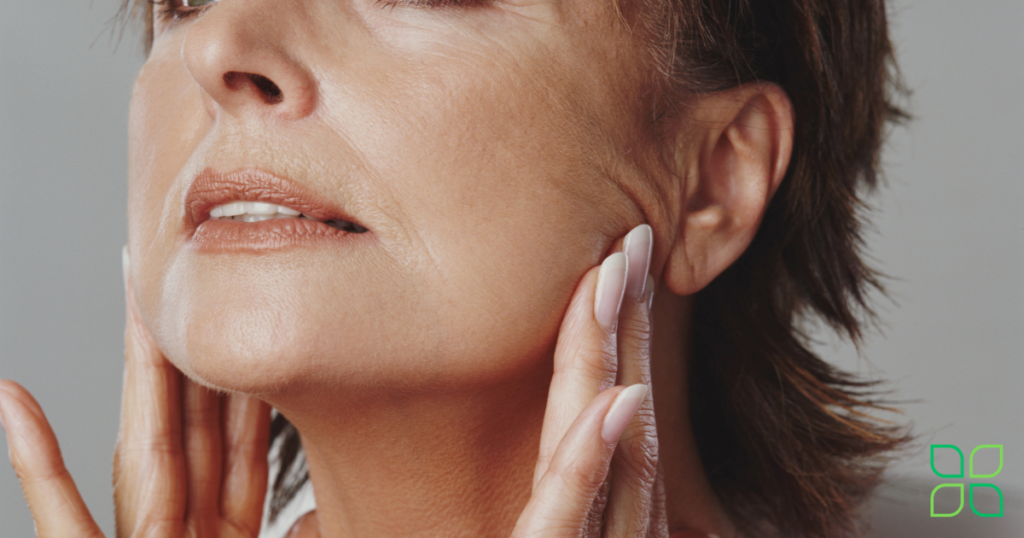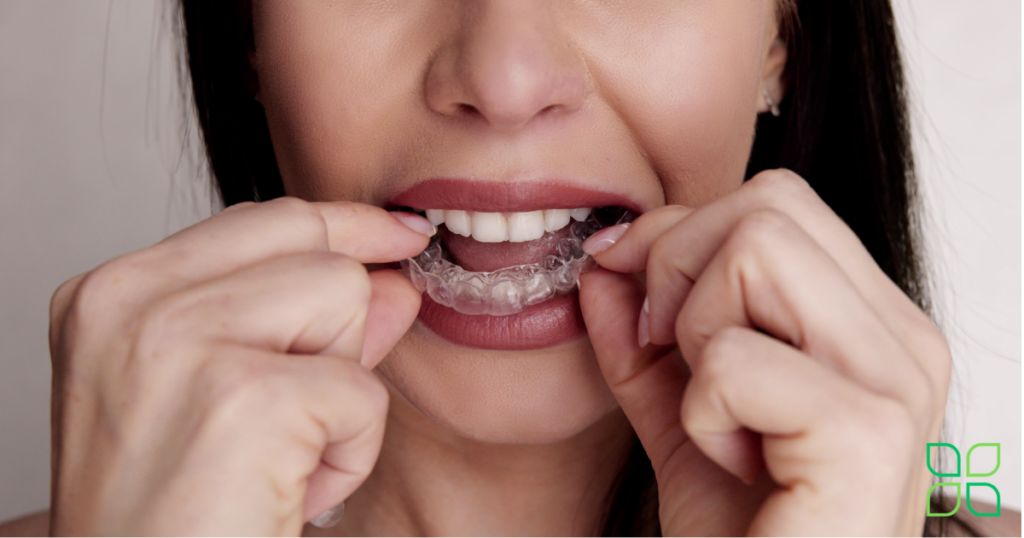Understanding Teeth Grinding: Causes, Symptoms, and Solutions
Teeth grinding, also known as bruxism, is a common problem that affects many individuals. It can lead to tooth damage and breakage, causing discomfort and pain. Dental guards are often used to mitigate the issue but only provide temporary relief. Sleep bruxism is the same thing, but it happens when you are sleeping. It’s considered a sleep-related movement disorder.

In this blog post, we will explore the causes of teeth grinding and discuss practical ways to address the problem, potentially eliminating the need for a mouth guard altogether. By understanding the root cause and implementing the right exercises and lifestyle changes, you can alleviate the tension and find relief from teeth grinding.
Bruxism may be subtle initially, but there are some signs to look at. Here are the symptoms of bruxism:
1. Teeth grinding or clenching:
Bruxism often involves the repetitive clenching or grinding of teeth, which can be audible to others or may go unnoticed by the person experiencing it. This grinding action can cause significant damage to the surfaces of teeth and lead to various dental problems.
2. Jaw pain or stiffness:
Bruxism can result in chronic jaw pain or stiffness, which may be particularly noticeable upon waking up. The constant strain on the jaw joints and muscles can lead to discomfort and limited movement.
3. Headaches:
Bruxism is commonly associated with headaches, including tension headaches and migraines. The excessive pressure exerted on the teeth and jaw can trigger or exacerbate headaches, leading to recurring pain episodes.
4. Tooth sensitivity:
Grinding or clenching can cause tooth enamel to wear down, exposing the dentin underneath. This can increase tooth sensitivity, making teeth more prone to discomfort or pain when exposed to hot or cold temperatures or certain foods.
5. Fractured or chipped teeth:
The excessive force generated by bruxism can cause teeth to become weakened and vulnerable to fractures or chips. This may require dental intervention, such as bonding or crowns, to restore the damaged tooth structure.

6. Temporomandibular joint disorder (TMJ):
Bruxism is closely related to TMJ disorders, which affect the joint connecting the jawbone to the skull. Individuals with bruxism are more susceptible to developing TMJ disorders, resulting in additional symptoms such as clicking or popping noises, difficulty in opening or closing the mouth, and pain in the jaw joint.
7. Sleep disturbances:
Bruxism can disrupt sleep, both for the person experiencing it and their sleep partner. The grinding or clenching noises can be loud and disruptive, leading to restless sleep, frequent awakenings, and sleep quality for the partner sharing the bed.
Understanding the Causes and Impacts of Teeth Grinding: Diet, Jaw Development, and Stress
Recognizing these symptoms early on can facilitate prompt diagnosis from your healthcare provider and give you a better idea of possible causes and the best ways to approach treatment to get the best results quickly.
The Impact of Childhood Diet:
The origins of teeth grinding can be traced back to early childhood. A diet of soft foods fails to provide the necessary stimulation for the jaw muscles, resulting in underdeveloped jaws. This lack of proper jaw development can lead to crooked teeth and the need for retainers. Unfortunately, retainers can exacerbate the problem by applying additional pressure to the teeth, causing tension to build up in the chewing muscles.
The Role of Tension and Stress:
Teeth grinding is often associated with excessive tension in the chewing muscles. When these muscles cannot relax, individuals may experience difficulty opening their mouths wide, leading to a vicious cycle of tension and jaw pain. Emotional stress and daily life pressures can further contribute to this problem. The cumulative effect of these tensions can result in headaches, jaw joint pain, and discomfort in the neck and shoulders. Stress reduction techniques help with overall health.

Teeth grinding can be a distressing problem, but it is not an issue without treatment options. By understanding the underlying causes and implementing the right exercises and lifestyle changes, you can effectively address teeth grinding and reduce tension in the jaw muscles. While it may take time and effort, the rewards of a relaxed and pain-free jaw are well worth it. So, take the first step towards a healthier jaw and a happier smile.
Effective Natural Remedies for Teeth Grinding and Jaw Tension
Here are 12 natural remedies you can start today to help you live a life with fewer teeth grinding.
1. Warm Moist Heat:
Applying a warm compress with a heat pack or a hot water bottle wrapped in a warm, moist towel to the side of your face can relax the jaw muscles, improving muscle function and reducing pain. This can be done before bedtime to relax the clenched muscles that cause head pain.
2. Ice:
Contrary to expectations, applying ice can decrease inflammation, numb the pain, and promote healing. However, it is important to avoid direct contact with the skin and limit usage to 10-15 minutes.
3. Soft Diets:
Resting the jaw is crucial for recovery. Switching to soft or blended foods temporarily allows the jaw to rest. Avoid hard, crunchy, and chewy foods that strain the jaw muscles.
4. Opening your Mouth Wide Open exercise:
Opening your mouth a little extra wide can stretch and reduce the tension in the masseter muscles, which are located on each side of your jaw. This muscle connects the cheekbone to the jawbone. Incorporating this movement into your daily life by eating larger foods like apples will force you to open your mouth more than usual. Just make sure not to overexert your muscles but push them enough to stretch them out.
5. Massage the masseter muscle:
Apply pressure to the masseter muscle with your thumb and massage it horizontally from your cheekbone to your jawbone. Try this with your mouth open and with it closed to get deeper into the muscle. Repeat this motion two to three times on each side and then switch to a vertical motion, moving from top to bottom.

6. Massage the muscles around the temporomandibular joint (TMJ):
The Temporomandibular joint is located just in front of the ears, where the jawbone connects to the skull. It allows jaw movement during activities like chewing, talking, and yawning. Massaging the muscles around this joint can help reduce tension in the area. Gently massage the area in front of the ears and along the jawline. You can feel it move as you open and close your mouth. Use your index and middle fingers and apply gentle pressure using small circular and back-and-forth motions for a few minutes. Open and close your jaw once again to get deeper into the tissues. Repeat a few times.
7. Practice relaxation techniques to reduce stress:
Take warm baths, get massages, and perform stress-relieving exercises. Massaging your neck muscles, shoulders, and face can help you unwind. Squeezing a tennis ball can also be beneficial for stress relief.
8. Splint Therapy:
Dentists can provide custom-made dental splints that act as a buffer between the upper and lower teeth, protecting them during times of intense stress or unconscious grinding.
9. Magnesium Supplementation / magnesium-rich foods:
Magnesium has been shown to improve relaxation and sleep and help with muscle soreness. Consider adding magnesium supplements or magnesium-rich foods like spinach, beans, and seeds to your diet for long-term relief.
10. Avoid alcohol:
Alcohol consumption can affect your sleep and increase jaw movement, leading to clenching. Cut down on caffeine and carbohydrates like candy and pastries, as they can also contribute to bruxism.
11. Sleep on your back:
Sleeping on your back can reduce stress on your jaw. Sleeping on your side or stomach may increase the chances of bruxism. If you can’t sleep on your back, use a contoured pillow under your face and an ordinary pillow between your arms. This position reduces strain on your jaw and neck and prevents you from rolling over onto your face.
12. Avoid Triggering Habits:
Avoid clenching and grinding your teeth consciously. Additionally, refrain from chewing gum, as it strains the chewing muscles and prevents them from resting and healing. Cradling your phone on your shoulder can irritate neck and jaw muscles, so it is best to use your phone minimally.
Effective Solutions to Teeth Grinding: Finding Triggers, Relaxation Techniques to Professional Help
To summarize, the issue of teeth grinding can be effectively addressed and managed by implementing the techniques mentioned above. By consistently practicing these approaches, individuals will not only experience a considerable reduction in teeth grinding but may even eliminate the habit. These techniques involve a comprehensive and holistic approach to combating teeth grinding, encompassing both preventive measures and therapeutic interventions.
First and foremost, it is imperative to identify and address any underlying causes or triggers contributing to your teeth grinding. This requires a thorough examination of various factors such as stress levels, anxiety, and sleep disorders. By adopting stress management techniques, such as practicing mindfulness, engaging in relaxation exercises, or seeking professional counseling, individuals can successfully reduce the incidence of teeth grinding linked to emotional distress.
Furthermore, establishing a regular sleep routine and ensuring adequate sleep is vital in curbing teeth grinding associated with sleep disorders. Maintaining a comfortable sleep environment, practicing good sleep hygiene, and utilizing relaxation techniques before bed can significantly prevent grinding during sleep.
Additionally, using oral appliances can provide immense relief and support in managing teeth grinding. Custom-made night guards or splints, obtained through consultation with a dental professional, offer a protective barrier between the upper and lower teeth, reducing the damaging effects of grinding. These appliances help alleviate the pressure on the jaw joint, muscles, and teeth, thereby minimizing teeth grinding.

Incorporating relaxation techniques into daily routines is essential in reducing teeth grinding. Techniques such as deep breathing exercises, meditation, yoga, a warm bath, and massage therapy can effectively alleviate muscle tension and stress, promoting relaxation and decreasing the likelihood of teeth grinding episodes.
Lastly, maintaining a healthy lifestyle by adopting a balanced diet, regular exercise, and avoiding excessive consumption of stimulants such as caffeine and alcohol can help reduce teeth grinding. Proper nutrition and regular physical activity promote overall well-being and help manage stress levels, which can alleviate teeth grinding tendencies.
In conclusion, implementing the above techniques into your daily routine can significantly reduce teeth grinding and its associated symptoms. While home remedies can provide short-term relief for bruxism symptoms, addressing the underlying cause of teeth grinding is essential for long-term improvement. Jaw exercises, relaxation techniques, and massages can help break the habit and prevent further damage. However, seeking professional intervention is recommended if home remedies do not provide consistent relief. Remember, clenching and grinding can be destructive and uncomfortable, so it is crucial to address the issue promptly.
